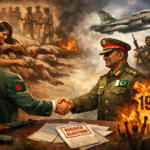Former Prime Minister of Pakistan, Imran Khan, has launched a scathing attack on the country’s influential Army Chief, General Asim Munir, accusing him of being driven by a hunger for power.
The 71-year-old leader and founder of the Pakistan Tehreek-e-Insaf (PTI) party, currently incarcerated in Adiala Jail in Rawalpindi, claims that General Munir reneged on a promise to stay neutral in political matters, a condition that Khan says was part of his agreement to endorse Munir’s appointment as the army chief.
Insiders close to Khan allege that Munir colluded with Nawaz Sharif, president of the Pakistan Muslim League-Nawaz (PML-N), to undermine Khan in return for dropping corruption charges against him.
Khan further alleges that Munir orchestrated attempts on his life through Pakistan’s notorious intelligence service and suppressed investigations into these incidents by stifling police inquiries and concealing CCTV evidence.
These accusations come at a time when General Munir is purportedly consolidating political power, leading to a harsh crackdown on opposition parties, activists, and the media. Khan claims CCTV footage and other evidence support his allegations that Munir devised a plan to assassinate him during a court appearance on March 18, 2023. According to Khan, Munir obstructed an independent investigation into the attack, with eyewitnesses pointing to the involvement of multiple attackers.
In a recent statement, Khan criticised the Inter-Services Intelligence (ISI), which he says has shifted its focus from counter-terrorism to targeting his party. He mentioned on X (formerly Twitter) a new military operation, ‘Vision Azm-i-Istehkam’, which he believes is aimed at eliminating terrorism but is instead being used to dismantle the PTI.
Khan, who has been imprisoned since August last year, expressed concerns that the ISI, initially tasked with safeguarding the nation from terrorism, is now being used to suppress political dissent within the country.
This dynamic, akin to the biblical struggle between David and Goliath, has seen the army initially support certain leaders to maintain control and stability, only to face opposition from these figures once they consolidate power. One notable example is Zulfikar Ali Bhutto. He rose to prominence with military backing following the 1971 war but later clashed with the army, leading to his ouster and execution under General Zia-ul-Haq’s regime. Similarly, Nawaz Sharif, initially a protégé of the military establishment in the 1980s, grew increasingly autonomous and confrontational, culminating in his removal through a coup in 1999 by General Pervez Musharraf. Imran Khan’s current predicament follows this historical pattern, highlighting Pakistan’s cyclical nature of civil-military tensions. Once installed in power with the army’s support, these leaders often seek to assert their independence and challenge the military’s dominance, triggering a fierce backlash. This recurring struggle underscores the persistent and complex power tussle between Pakistan’s civilian leadership and its military establishment, each vying for supremacy in the country’s governance.







You ought to be a part of a conjtest for one of the greatest sites on thee web.
I wiol highly recommend this website! https://glassi-Greyhounds.mystrikingly.com/
download slot machine games
References:
https://www.google.com.pe/url?q=https://www.divephotoguide.com/user/drakesarah98